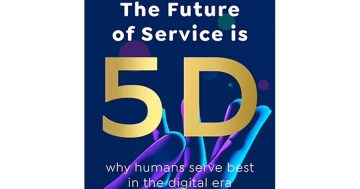Adriana Stan and Tom Goodwin* say it’s time to disrupt Human Resources if we want talent fit for the digital age.
 The worst thing we ever did in corporate life was to take the most vital part of any organisation — the people powering it — and label it so dismissively as “human resources”.
The worst thing we ever did in corporate life was to take the most vital part of any organisation — the people powering it — and label it so dismissively as “human resources”.
We reduced talent to a simple asset: one to be standardised, controlled, commoditised, and managed like any other form of capital.
We created a department whose sole purpose is to extract value and enforce compliance and put them in charge of an ecosystem built around formalised processes, sameness, common practices, and conformity.
The result is the institutionalised mediocrity plaguing many organisations today.
How we got here
The rise of HR can be traced back to the dawn of the industrial age, and the reason behind its creation is also at the very core of what renders it obsolete today.
While easily enforceable in factories and workflows that revolve around uniformity and consistency, HR faces existential threats in a world of increasingly intangible labour performed in a digital realm by workers whose motivations extend beyond monetising their labour.
For centuries, humans have tried to emulate machines: we’ve mastered repetition, following orders, being on time, optimising ourselves and our outputs.
It’s time to accept that machines are best at being machines and celebrate what being a human is all about: not least our ability to question, challenge and adapt.
Difference, diversity, and divergent thinking
When we embrace the new needs of a post-digital world and build skills that support it, we will quickly see the value of remarkable people rise, while the value of those who blend in, who hide in org charts and shirk responsibility, diminishes.
The post-digital economy thrives on difference, diversity, and divergent thinking.
But when HR comes in to confine talent to boxes, to fit imagination into checklists, and to put the lid on enthusiasm, it all bursts into a violent clash of values: one that’s at the core of why organisations rooted in tradition are struggling.
New power versus old
This crisis of modern labour stems from three factors:
- a tension between human needs and outdated workplace structures
- new societal values and organisations unequipped to handle them (because the future is often modelled on the past)
- and the emergence of a creative class — people who are finding new outlets for expression.
In the battle of new power versus old, we value pluralism over imposed consensus, entrepreneurialism over tightly regimented roles, and centralised authority, curiosity and continued learning versus formalised training.
Culture of change
Creating a culture of change and nurturing values like flexibility and ambition is what sets the foundation for innovation.
But what we see most often is organisations adapting around old systems, instead of completely rethinking leadership and management.
When we champion compliance, mediocrity sets in.
We recruit people to fit into a space, instead of reconfiguring, expanding or reshaping the space.
We’d rather hold on to the job spec than bend it around a remarkable person.
What if we championed difference and diversity of talent?
What if we embraced the discomfort of hiring people who stand out — people who challenge us, because they are not exactly like us, people who don’t fit the pattern of everyone who’s filled their roles before?
What should HR really look like?
Perhaps the greatest opportunity in this new, post-digital economy lies in this promise: that each of us can realise our full potential by expressing our broad range of our skills.
Because that inherently benefits those who employ us.
The next and arguably most crucial step is retention.
What’s the point of hiring disruptors but not empowering them?
Such trophy employees continue to be hired as a defensive mechanism designed to signal change without actually getting the organisation to change.
They sit on the edges, powerless, the very skillset they were brought in to use, untapped.
Without a culture that allows them to drive change or make decisions, this talent feels unutilised, stuck, stifled.
Until they’re approached by the next recruiter.
When we listen to the mavens and misfits, when we inspire the changemakers we brought in and support them with a tribe of people they can connect with, and with budgets and decision-making power, we set the whole organisation up for success.
What if we valued retention over the lure of talent seduction, over the quick boost to the organisation’s ego that comes from chasing new recruits?
Can we create a system where loyalty is truly rewarded?
And can we shift away from a system that rewards compliance and gives recognition based entirely on what is most easily measured?
The organisations that can get people to feel empowered, to feel free to show their passions both in and outside of work, to drive change by employing the full range of their talents, to express their curiosity and uncensored enthusiasm, are the ones best positioned to thrive in the future.
When people have the flexibility to work from anywhere at any time, they will end up achieving more, not less.
When they can pursue their interests freely, those interests won’t get in the way of their jobs — they will enrich and equip them with new skills to use in their jobs.
When they can bring their full selves to work, they’ll pour their full selves into their work.
And when you do the necessary work to cultivate openness and transparency, you’ll build trust and accountability and strengthen the fabric of your organisation.
So, let’s stop looking at talent purely through the lens of acquisition and let’s see people as more than just human resources.
It may be worth asking yourself: What would HR look like if we invented it today?
* Adriana Stan is a Strategic Communications Consultant at Interesting Speakers. Tom Goodwin is Head of Futures and Insight at Publicis Groupe.
This article first appeared at www.weforum.org/agenda.











